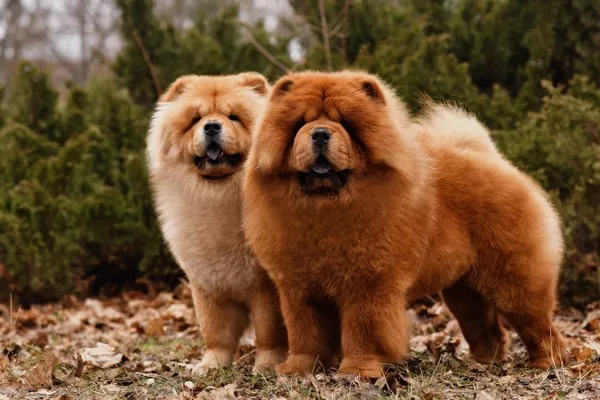Chow Chows, known for their lion-like mane and distinctive appearance, are a beloved breed among dog enthusiasts. One common concern among prospective Chow Chow owners is shedding. Many wonder if Chow Chows shed a lot and how to manage their grooming needs. In this comprehensive article, we will explore the shedding habits of Chow Chows, the factors that influence their shedding, and tips on how to keep their coat healthy and minimize shedding.
Understanding Chow Chow Coat Types
Chow Chows are known for their luxurious double coat, which is a defining characteristic of the breed. To understand their shedding habits, it’s essential to comprehend the composition of their coat:
Outer Coat: The outer coat of a Chow Chow is dense, straight, and coarse in texture. It gives them their distinctive appearance and provides protection from the elements.
Inner Coat: Beneath the outer coat, Chow Chows have a soft, dense, and insulating undercoat. This undercoat is responsible for keeping them warm in cold weather.
Double Coat: The combination of the outer and inner coats results in a double coat, which serves both practical and aesthetic purposes.
Chow Chow Shedding Patterns
Chow Chows are not considered heavy shedders year-round, but they do have specific shedding patterns influenced by seasonal changes and hormonal factors:
Seasonal Shedding: Like many double-coated breeds, Chow Chows undergo seasonal shedding. They tend to shed more in the spring and fall as their coat transitions to accommodate changing temperatures. During these periods, you can expect an increase in shedding.
Blowing Coat: The term “blowing coat” refers to a more significant shedding phase experienced by Chow Chows. This typically occurs once or twice a year, primarily in the spring and sometimes in the fall. During this phase, Chow Chows shed their undercoat to prepare for warmer weather or colder temperatures, depending on the season.
Hormonal Influences: Hormonal changes can also impact shedding in Chow Chows. Females may experience increased shedding during their heat cycles and pregnancy, while males might have hormonal fluctuations affecting their shedding patterns.
Factors That Influence Chow Chow Shedding
Several factors can influence the shedding habits of Chow Chows:
Climate: The climate in which a Chow Chow lives can significantly impact their shedding. In colder regions, they tend to grow a thicker coat to keep warm, resulting in more shedding during seasonal transitions. In warmer areas, they may shed less consistently throughout the year.
Diet and Nutrition: Proper nutrition plays a crucial role in a dog’s coat health. A well-balanced diet rich in essential nutrients can contribute to a healthier coat and potentially reduce excessive shedding. Consult with a veterinarian to determine the best diet for your Chow Chow.
Health and Hygiene: The overall health and hygiene of your Chow Chow can affect their shedding patterns. Regular grooming, including brushing and bathing, helps remove loose fur and prevent matting, which can exacerbate shedding. Health issues or allergies can also lead to increased shedding, so it’s important to monitor your dog’s well-being.
Genetics: Genetic factors can play a role in a Chow Chow’s shedding tendencies. Some individuals may inherit a more profuse coat that sheds slightly more than others. Responsible breeding practices can influence coat quality.
Managing Chow Chow Shedding
While Chow Chows do shed, there are effective strategies to manage their shedding and keep their coat healthy:
Regular Brushing: Brushing your Chow Chow’s coat is essential to remove loose fur and prevent matting. During shedding seasons, increase the frequency of brushing to daily or every other day. Use a suitable brush, such as a slicker brush or undercoat rake, to reach the dense undercoat effectively.
Bathing: Regular bathing can help reduce shedding by removing loose hair and debris. Use a high-quality dog shampoo and conditioner, and ensure your Chow Chow is completely dry after the bath to prevent matting.
Healthy Diet: Provide your Chow Chow with a well-balanced diet that meets their nutritional needs. Consult with your veterinarian to determine the best food for your dog’s coat health. Omega-3 fatty acids, often found in fish oil supplements, can promote a healthy coat.
Hydration: Ensure your Chow Chow stays well-hydrated. Proper hydration supports overall coat health and can minimize excessive shedding.
Grooming Tools: Invest in quality grooming tools designed for double-coated breeds like Chow Chows. These tools are designed to reach the undercoat and effectively remove loose hair.
Professional Grooming: Consider occasional professional grooming appointments. Professional groomers have the experience and tools to manage Chow Chow shedding effectively and can provide additional guidance on coat care.
Allergen Management: If allergies are a concern, maintain a clean living environment by vacuuming regularly, washing your dog’s bedding, and using air purifiers. Consult with an allergist to address any allergy-related concerns.
Consult a Veterinarian: If you notice sudden or excessive shedding, consult your veterinarian. Shedding can be influenced by underlying health issues or allergies, and your vet can provide guidance and treatment options.
Conclusion
In conclusion, Chow Chows do shed, but the extent and frequency of shedding can vary based on factors such as seasons, climate, and genetics. Understanding the shedding patterns and factors influencing your Chow Chow’s coat can help you manage their shedding effectively. Regular grooming, a balanced diet, and proper care contribute to a healthier coat and a happier Chow Chow. With the right approach, you can enjoy the company of your beloved Chow Chow without being overly concerned about shedding.


